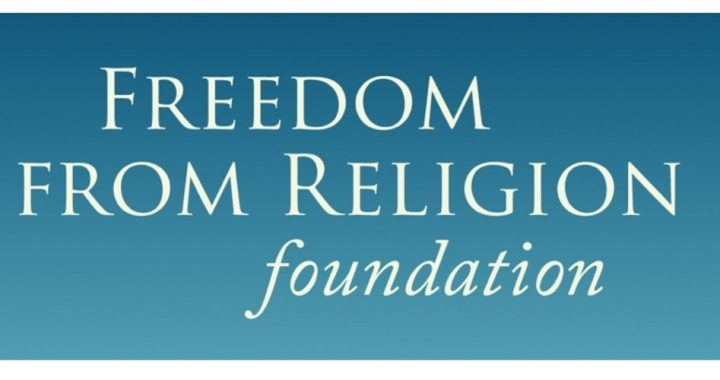
The Freedom From Religion Foundation (FFRF) has turned its attack on one of its long-time allies, announcing that it is suing the federal government over the failure of the Internal Revenue Service to bar churches and Christian organizations from involvement in the political process.
According to the FFRF, its lawsuit, filed November 14 in a Madison, Wisconsin, U.S. District Court, “argues that the IRS is not enforcing the federal tax code, which prohibits tax-exempt religious organizations from electioneering.” The FFRF insists that the IRS’ lack of enforcement “is a violation of the establishment clause of the First Amendment and a violation of equal protection rights because the same preferential treatment is not provided to other tax-exempt organizations” — such as the FFRF. The group complained that churches and other Christian groups have taken to “blatantly and deliberately flaunting the electioneering restrictions” set up by the IRS back in the 1950s.
Among the violations the group cited were ads published by the Billy Graham Evangelistic Association (BGEA) in the New York Times, USA Today, the Wall Street Journal and other newspapers encouraging Americans to vote in line with biblical principles. The 94-year-old Billy Graham also reportedly met in October with Republican presidential nominee Mitt Romney, pledging to do “all I can” to help in Romney’s elections efforts.
The FFRF is also sore over the efforts of Catholic bishops to encourage their members to vote in line with a “Catholic conscience” and warning against supporting candidates who embrace abortion and same-sex marriage. In the run-up to the election, scores of priests and bishops addressed their flocks concerning the issues, including Green Bay, Wisconsin, Bishop David L. Ricken; Peoria, Illinois, Bishop Daniel R. Jenky; and Bishop Robert Morlino of Madison, Wisconsin — the three Catholic leaders specifically targeted by the FFRF.
Most galling to the FFRF, however, has been the IRS’ refusal to go after pastors who participated in this year’s “Pulpit Freedom Sunday,” organized by the Alliance Defense Fund (ADF). For the past several years the ADF has encouraged pastors to take the first Sunday in October to preach sermons from their pulpits endorsing specific candidates, tape the sermons, and send them to the IRS. The goal, said ADF spokesman Erik Stanley, is to goad the IRS into prosecuting the pastors for violating the 1954 Johnson Amendment, which prohibits churches, Christian groups, and other tax-exempt organizations from officially endorsing candidates.
In the nearly 60 years since implementation of the tax rules, the IRS has seldom prosecuted churches for violating the rules because, said Stanley, federal tax officials fear the rule would ultimately be overturned by the Supreme Court as unconstitutional. “They just prefer to put out these vague statements and regulations and enforce it through a system of intimidation,” said Stanley. “Pastors are afraid to address anything political from the pulpit.” He said the annual “Pulpit Freedom Sunday” amounts to a “head-on constitutional challenge” that the ADF is certain will be won by those standing for religious freedom.
In its lawsuit the FFRF complains that such non-enforcement of the IRS’ own rules “constitutes preferential treatment to churches and religious organizations that is not provided to other tax-exempt organizations, including FFRF. Churches and religious organizations obtain a significant benefit as a result of being non-exempt [sic] from income taxation, while also being able to preferentially engage in electioneering, which is something secular tax-exempt organizations cannot do.”
The FFRF cited a Bloomberg news article quoting Russell Renwicks, an official with the IRS’ Tax-Exempt and Government Entities division, as saying that the IRS had temporarily suspended tax audits of churches, even though it has supposedly been bombarded with complaints about churches violating IRS rules. “We are holding any potential church audits in abeyance,” said Russell, until the IRS can review its own rules and decide how to proceed with possible violations.
According to an Associated Press story cited by the FFRF, the IRS hasn’t actively investigated complaints about so-called violations by churches since at least 2009.
In the case of the Billy Graham ads, which were published during the heat of the presidential race, the evangelist encouraged Americans “to vote for those who protect the sanctity of life and support the biblical definition of marriage between a man and a woman.” While no candidate was specifically mentioned in the ads, the inference was clear that Graham was endorsing Mitt Romney, who had at least given lip service to being pro-life and to supporting traditional marriage.
In a statement regarding the ad campaign, BGEA noted that the ads “intentionally do not mention any candidate, political party, or contest, urging instead for readers to cast votes for candidates — at all levels — based on their support for biblical values.”
But Rob Boston, a senior policy analyst with the secular Americans United for Separation of Church and State (AUSCS), told the Christian Post that he believes “a strong case can be made that the Graham ministry violated federal law. [While] IRS guidelines allow churches and ministries to engage in issue advocacy, they warn against tying such advocacy to a candidate.” He added that “IRS rules make it clear that a church or ministry can endorse a candidate even without mentioning his or her name.”
Like the FFRF, AUSCS has targeted churches that encouraged their parishioners to vote in line with morality and traditional values. Specifically the secular group filed a complaint with the IRS against a tiny congregation in Leakey, Texas, called Church in the Valley, over its display of a sign which read: “Vote for the Mormon, not the Muslim! The capitalist, not the communist!”
The ADF’s Erik Stanley said that such lawsuits are further evidence that the secular groups “are trying to use the Johnson Amendment in the tax code as a tool of intimidation to silence and censor churches.” Specifically addressing the FFRF action, Stanley called it little more than “a nuisance lawsuit; it doesn’t have any legal basis whatsoever. The IRS cannot be forced to interpret the Johnson Amendment to apply it in a particular way that the Freedom From Religion Foundation likes.”



